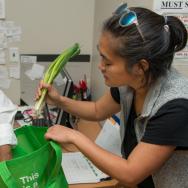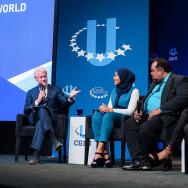For students attending the Clinton Global Initiative University, there was a simple question for Chelsea Clinton: What advice would you give your college-aged self?
“I wish I had more time for the awe and wonder,” said the vice chair of the Clinton Foundation, speaking at an Oct. 20 event at the University of Chicago. “And I think I would have, if I had asked for help more quickly.”
Sitting next to her parents, President Bill Clinton and former Secretary of State Hillary Clinton, during the closing plenary of CGI U, Chelsea Clinton shared the pressure she felt to have “99.5 percent of everything figured out” instead of admitting her own shortcomings.
“I could have learned things more quickly if I’d had the confidence—because I don’t think it was the humility—to ask for help,” she said.
That was one of the key messages at the 11th annual CGI U, held this year at UChicago. The three-day event engages the next generation of leaders and social entrepreneurs to help them make a positive impact in communities worldwide. The conference included more than 1,000 students—with more than 150 students from UChicago—focused on commitments to action that address specific problems in one of five focus areas: education, environment and climate change, poverty alleviation, peace and human rights, and public health.
Such social impact projects by UChicago students include confronting the air pollution crisis in India, fighting the opioid epidemic in the United States and improving sustainable farming in Haiti. Learn more about the projects here.
Finding solutions and putting them into action can be difficult without collaboration and optimism.
“There’s so much in the world that I don’t know about,” said Ray Andrada, a third-year UChicago law student who attended CGI U. “There are fearless young people who are tackling these big problems, and I should be inspired to think on a more daring scale as well.”
Ambitious themes ran through the conversation Saturday led by the Clintons, who spoke for more than an hour at the University’s Ratner Athletics Center. During a wide-ranging discussion moderated by Chicago Community Trust CEO Helene Gayle, Bill, Hillary and Chelsea Clinton called on the audience to reach out to others with open minds, but to do so without losing conviction in their own beliefs.
“Too many people are, when they get older, broken by their disappointments,” former President Clinton said. “Don’t you ever let that happen to you.”
“Because nobody gets out of life for free,” he added. “And nobody gets to win all the time. But my faith is rooted in what I see here every year, and what young people say to me all over America and all over the world.”
During the discussion, Hillary Clinton acknowledged that the public has had reason to be frustrated with democratic institutions. But, she added, it remains crucial to combat the forces attempting to undermine such institutions.
“Every person has a stake in working through, in your own mind, how you can hold institutions accountable without walking away from them,” she said. “Or without giving up on them, and playing into the hands of people who want to see them disrupted and dismantled—because that gives them more space to grab and hold on to power over you.”
Before the evening discussion, students participated in skill-building workshops and special programs, all designed to help them further develop their commitments.
“One of the biggest benefits here is just inspiration and a reminder of why we’re all doing what we’re doing,” said UChicago fourth-year Josh Aaronson, a co-founder of the non-profit Debate It Forward.
Hafsah Lak, MPP’17, participated in CGI U for the first time two-and-a-half years ago. In 2017, she returned to be recognized for her work on Violence Against Women Centers in Pakistan. This time, she attended as a speaker.
“Listening to all the speeches and everyone’s perspectives, it still awes you,” Lak said.
On the final day, Chelsea Clinton and Chicago Mayor Rahm Emanuel led students in a Day of Action, during which the students went to nine different service sites to complete projects across several community organizations on Chicago’s South Side.
Through Chicago Booth’s Rustandy Center for Social Sector Innovation, the University continues to expand support for students and alumni who are committed to tackling complex social and environmental issues. The Office of the Provost partnered with the Rustandy Center, the Institute of Politics, the Harris School of Public Policy, the School of Social Service Administration, and the Office of Civic Engagement to plan this year’s CGI U meeting.

